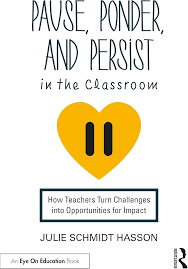Effectively managing resilience has never been more important for educators. In the third of her five-part series Resilient in the Middle, Julie Schmidt Hasson looks into the power of building strong relationships with students and colleagues.
By Julie Schimdt Hasson
 I live on a gravel road next to a river in the mountains of western North Carolina. I have a handful of neighbors, but there is plenty of space between our houses.
I live on a gravel road next to a river in the mountains of western North Carolina. I have a handful of neighbors, but there is plenty of space between our houses.
You might not expect neighbors to know each other in this context, but the challenges of living where floods and sudden storms can wreak havoc necessitates communication and connection.
On the morning of September 27, 2024, we knew a storm was coming, but we didn’t expect it to be exceptionally strong by the time it reached us. Hurricane Helene poured about 24 inches of rain on our already rain saturated road, and wind gusts reached up to 75 miles per hour.
By the time the storm left us that afternoon, our little river had risen 27 feet, and trees had fallen across the road and on top of several homes. The power went out mid-morning, which meant no cell phone connectivity, and even those with landlines couldn’t get a connection.
Once the storm quieted, neighbors started to emerge and congregate on the road. We were relieved to discover that no one was hurt. However, our little road was in rough shape. Several large trees lay across the road, mud slides narrowed it, and rushing water created deep gorges. There was no way for us to get out or help to get in.
In the hours and days that followed, our neighbors worked together to clear the road. Jim brought his chainsaw, and Dale brought his skid steer to move trees and redistribute gravel. Everyone carried branches and moved rocks. Neighbors offered each other water, food, and encouragement.
The hurricane showed me the importance of relationships in difficult times. Relationships can always add joy and sweetness to our lives, but they are essential in a crisis. I’m grateful that clearing the road did not depend solely on me and my hand saw. Each neighbor showing up with unique strengths and tools that ensured a quicker recovery.
Teaching is full of challenges, too, and the teaching life brings its own kind of storms. Strong, supportive relationships can help you navigate those storms with more peace and resilience.
Relationships and Resilience
Psychologist Dr. Jill Suttie argues that much of the research on resilience is focused on building individual strengths and practices, but building relationships may matter more.
Strong relationships are a cornerstone of resilience because they provide support, care, and connection. They can provide a sense of belonging, purpose, and self-worth, which are essential for maintaining a positive outlook. Supportive relationships also offer perspective and encouragement during difficult times, reducing the risk of developing mental health issues like depression or anxiety.
As educators, we tend to think of building strong relationships as something we do to impact others, but we are also helping ourselves. In this Resilient in the Middle series, we’ve been exploring what charges and drains our teacher batteries. If you made your list of chargers and drains in the first article of the series, you likely listed something related to relationships in both columns.
Strong, supportive relationships are a universal battery charger (even for us introverts), but strained or difficult relationships can be a big battery drain. As teachers, we spend our days with students and colleagues, and these relationships are vital for work satisfaction and overall well-being. Let’s consider how to leverage the chargers, and then we’ll identify some helpful strategies for the drains.
Student-Teacher Relationships
Strong student-teacher relationships are a lever for better academic, social, and emotional outcomes for students, and in this case, what’s good for students is also good for you. Feeling a sense of connection and rapport with students leads to greater joy and fulfillment in teaching.
Teachers who build strong relationships experience a greater sense of efficacy, the belief in one’s ability to positively impact student outcomes. Nothing can lift a tired teacher like seeing evidence of student growth.
In the context of a strong relationship, students are more likely to comply with rules and requests, and they are more likely to engage in lessons. Teachers who build strong relationships experience fewer discipline problems and have less conflict with students. When you feel supported, respected, and valued by your students, you are better equipped to navigate the demands of the job. Creating more comfort and less conflict with students can help keep your battery charged.

Colleague-Colleague Relationships
When I started my current job, I remember thinking that I just needed to find my people. Teaching can be an emotionally demanding profession, and colleagues often serve as a lifeline during tough moments. When we have supportive relationships with our peers, we have a space to vent frustrations, share successes, and process challenges. We feel less isolated and more connected.
Strong relationships with colleagues also create a network where we can collaborate on lesson planning, classroom strategies, and problem-solving. This collaborative culture not only lightens individual workloads but also enhances the quality of teaching.
Knowing there’s a team to lean on during stressful times reinforces our confidence and reduces the burnout often associated with trying to do it all alone. Engaging with colleagues who share similar challenges and goals encourages professional growth and helps us enjoy the work more. Colleagues celebrating each other’s successes and supporting one another through setbacks can be powerful battery chargers.
Building Strong Relationships
John Gottman is a psychologist and relationship researcher who developed the concept of bids for connection. He primarily studies married couples, but his work is applicable for teachers as well.
According to Dr. Gottman, bids are attempts to connect with others through verbal or nonverbal cues, ranging from simple gestures to more direct statements. They can be as subtle as a smile or as explicit as asking for help or advice. Gottman found that these bids play a pivotal role in building and maintaining strong relationships.
Dr. Gottman describes how our responses to bids determine the strength and quality of our relationships, and he categorizes responses into three types:
- Turning Toward – Acknowledging and positively engaging with the bid.
- Turning Away – Ignoring or dismissing the bid, either intentionally or unintentionally.
- Turning Against – Responding negatively, such as with sarcasm or hostility.
Dr. Gottman’s research indicates that consistently turning toward bids strengthens emotional bonds and fosters trust, while patterns of turning away or turning against can lead to disconnection. In other words, our relationships with students and colleagues (and others in our lives) are built on noticing and responding positively to bids for connection.
Even small actions, such as commenting on a student’s new sneakers or asking about a colleague’s new grandchild, are opportunities to deepen connection. Recognizing and responding to bids can be a relationship builder and battery charger.

Managing Relationships
Unfortunately, not all relationships are battery chargers. If a colleague’s words, actions, or habits are draining, try to limit your time and interactions with that colleague. When that’s not possible, guard your mental and emotional health by setting clear boundaries.
Boundaries define how we want to be treated and protect our well-being. To identify your boundaries, determine what feels comfortable and uncomfortable for you in various situations. Then, communicate directly and concisely about your limits and boundaries to avoid misunderstandings because ambiguity can lead to conflict. Not everyone responds positively to boundaries initially, but holding your ground may save your relationships as well as the charge on your teacher battery.
Teachers usually identify relationships with students as battery chargers, but student-teacher relationships require engagement from both sides. Not every student will choose to connect, and some students will choose to create conflict.
Resilience requires us to remember that we can’t control others, but we can always extend compassion and respect. Recognizing that behavior often stems from underlying issues – such as frustration, fear, or unmet needs – helps, and we’ll explore the practice of reframing challenges with students as opportunities for impact in the next article in this series.
Keeping your battery charged requires protecting your own well-being, not taking things personally, and not carrying emotionally heavy interactions home with you. Imagining a bubble around yourself sounds silly, but it works.
The Resilience Building Value of Relationships
To stay charged and resilient, intentionally cultivate relationships. Supportive interactions and collaboration create moments of joy and connection, making the hard work of teaching feel a little lighter. And close relationships create a support network that helps teachers navigate challenges, reducing stress and potential burnout.
Supportive relationships can bring you pleasure and satisfaction, and they can sustain you during difficult times. Building relationships with colleagues and students can help you stay longer, grow stronger, and keep making an impact.
 Dr. Julie Schmidt Hasson is a professor in School Administration at Appalachian State University in Boone, NC. A former teacher and principal, she now teaches graduate courses in school leadership and conducts qualitative research in schools. She also works with schools and districts to increase teacher resilience and retention.
Dr. Julie Schmidt Hasson is a professor in School Administration at Appalachian State University in Boone, NC. A former teacher and principal, she now teaches graduate courses in school leadership and conducts qualitative research in schools. She also works with schools and districts to increase teacher resilience and retention.
Julie studied to become a Certified Resilience Trainer under the guidance of Dr. Amit Sood. She shares the impact resilience can have on educators in her book, Pause, Ponder, and Persist in the Classroom: How Teachers Turn Challenges into Opportunities for Impact, at her website Teacher Recharge, and in her five-part MiddleWeb series.
To learn more about Julie’s research on long-term teacher impact see Lessons that Last: 185 Reflections on the Life-Shaping Power of a Teacher (Routledge/Eye On Education, 2024). Read our excerpt. Follow her on Bluesky, X-Twitter and Instagram. She is also the co-host of the Lessons That Last podcast.



